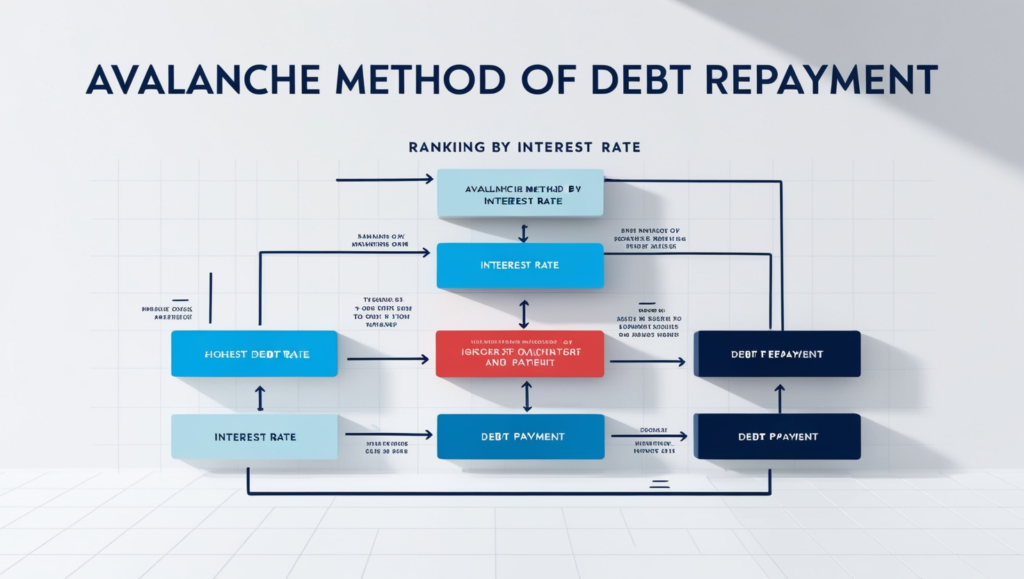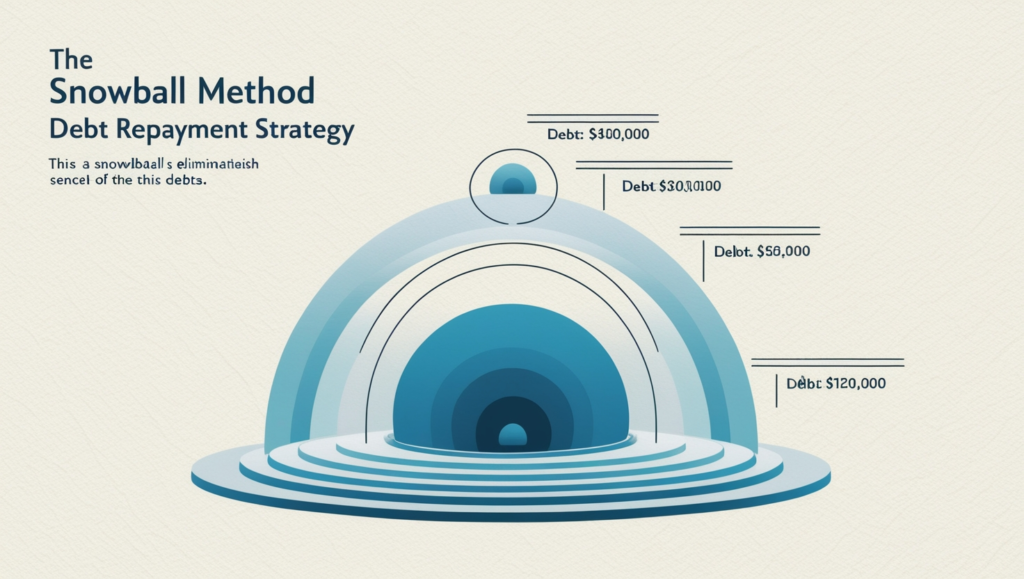Getting out of debt fast requires a strategic approach and a commitment to making changes in your financial habits. Whether you’re dealing with credit card debt, student loans, or personal loans, there are several effective ways to pay down debt more quickly. By prioritizing your debts, creating a realistic budget, and cutting unnecessary expenses, you can free up more money to put toward your outstanding balances.
This article will walk you through actionable strategies to help you get out of debt fast. For more expert tips, check out trusted resources like NerdWallet and Experian. By applying these methods, you’ll be on your way to financial freedom in no time.
Prioritize Your Debt: Two Effective Methods to Pay Off Debt Fast
When it comes to getting out of debt fast, the method you choose can make a big difference. Two popular approaches are the Avalanche Method and the Snowball Method. Both strategies offer advantages, but which one is right for you depends on your personal goals and preferences.
Avalanche Method: Pay Off High-Interest Debt First
The Avalanche Method is often considered the most financially efficient way to reduce debt. This strategy focuses on paying off the debts with the highest interest rates first. The rationale is simple: by tackling high-interest debt, you reduce the amount of money spent on interest over time. As a result, you pay off your debt faster and save more money in the long run.
For example, if you have credit card debt at 20% interest and a student loan at 4%, the Avalanche Method recommends putting any extra payments toward the high-interest credit card debt, while maintaining minimum payments on the lower-interest student loan. Once the credit card debt is paid off, you can focus on the next highest interest debt.
This approach is ideal for those who are motivated by saving money and want to minimize interest payments. However, it may feel slower at first, especially if your highest-interest debts also have large balances.
Snowball Method: Pay Off Smaller Debts First
On the other hand, the Snowball Method focuses on paying off the smallest debts first. With this method, you pay off your debts starting with the one with the smallest balance. Once the smallest debt is eliminated, you move on to the next smallest, and so on. As each debt is paid off, the amount of money you have available to put toward the next debt increases, creating a “snowball” effect.
The Snowball Method offers a psychological advantage: it provides quick wins. Eliminating smaller debts can boost your confidence and motivation, encouraging you to keep going. It’s especially effective if you need encouragement to stay on track with your debt repayment plan.
While this method may result in paying more interest in the long term, it can be a great option for people who struggle with staying motivated. The sense of progress from paying off smaller debts quickly can make it easier to stay committed to your overall goal.

Which Method is Right for You?
Both methods have their strengths, but the right choice depends on your situation. If you’re focused on saving money and are patient enough to wait for the long-term benefits, the Avalanche Method is a good fit. If you need motivation to stay on track, the Snowball Method might be better.
To get out of debt fast, consider which approach will keep you committed to your financial goals. Start by reviewing your debts and decide whether tackling high-interest rates or achieving small victories will work best for you.
For more tips on how to get out of debt fast, check out expert advice from financial blogs and tools like NerdWallet or Experian.
Create a Budget to Get Out of Debt Fast
A budget is an essential tool for managing your finances. It helps you track your income and expenses, providing a clear picture of your financial situation. By understanding where your money is going, you can identify areas where you can cut back.
Start by listing all sources of income, such as your salary or side hustle. Then, list your fixed and variable expenses. Fixed expenses include rent or mortgage payments, utilities, and insurance. Variable expenses include groceries, entertainment, and transportation.
Once you have a clear overview, look for areas where you can reduce spending. Consider cutting back on discretionary expenses like dining out or subscriptions you don’t use. Redirect the money saved from these cuts into paying down your debt.
A well-planned budget ensures you have more funds available for debt repayment. This helps you pay off debt faster while staying within your financial limits. For more guidance on creating a budget that works for you, check out resources like NerdWallet or Dave Ramsey. By sticking to a budget, you’ll have better control over your finances and be able to pay off debt more effectively.

Consider Debt Consolidation to Simplify Repayment
Debt consolidation can make repaying your debts easier by combining multiple loans into one. With a debt consolidation loan, you may be able to secure a lower interest rate, which can reduce your overall monthly payment. This can simplify your financial situation by consolidating your debts into a single payment.
However, it’s important to carefully consider the pros and cons before proceeding. While a lower interest rate can save money, some consolidation loans may have fees or extend the loan term, which could increase the total amount you pay in the long run. Additionally, consolidating your debt does not solve the root cause of overspending or poor financial habits.
If you’re considering this option, make sure to shop around for the best rates and terms. For more insights on how to get out of debt fast, explore resources like NerdWallet or Experian for additional guidance.
Negotiate with Creditors to Reduce Debt
Negotiating with your creditors is a powerful step toward managing your debt. Many people don’t realize that creditors are often willing to work with you. If you’re struggling to make payments, contact your creditors and explain your situation. In many cases, they may be willing to lower your interest rate, reduce your monthly payment, or even waive late fees.
The key to successful negotiations is to remain calm and respectful while providing a clear explanation of your financial difficulties. Creditors may be more likely to help if they see that you’re genuinely trying to manage your debt. If you have a history of making timely payments, they might offer you better terms. Negotiating can make it easier to pay off debt faster, as lower interest rates and reduced fees can free up more money for principal payments.
Utilize Balance Transfer Credit Cards
Balance transfer credit cards are another option to help you pay off high-interest debt faster. These cards offer a temporary 0% APR period, typically between 12 to 18 months. During this time, you can transfer high-interest balances from other cards and pay them off without accumulating more interest. This can provide significant savings, especially if you have large balances on cards with high interest rates.
However, it’s important to understand the terms. Most balance transfer cards charge a fee (usually 3-5% of the amount transferred). Moreover, once the promotional period ends, the interest rate jumps to a much higher rate. To take full advantage of this strategy, you must be able to pay off the transferred balance before the 0% APR period expires. Failing to do so can lead to high interest charges that undermine the benefits.
For more information on how to get out of debt fast using these strategies, visit NerdWallet and Experian.

Increase Your Income to Pay Off Debt Faster
Boosting your income is one of the most effective ways to accelerate your debt repayment journey. By generating extra cash, you can direct more funds toward paying down your debt. There are several ways to increase your income, depending on your skills, interests, and available time.
One of the easiest options is to take on a side hustle. This could include freelance work, such as writing, graphic design, or web development, or gig economy jobs like driving for rideshare services or delivering food. These side jobs can often be done in your spare time and help increase your monthly earnings. If you have a hobby or a skill that others value, such as photography or tutoring, you can turn it into a profitable side business.
Another option to increase your income is exploring remote work or part-time jobs that match your skills and expertise. Platforms like Upwork and Fiverr provide ample opportunities to find freelance work in fields ranging from writing and graphic design to web development and marketing. These platforms allow you to set your own schedule, making them a flexible choice for earning extra income on the side.
Additionally, consider selling handmade products or digital goods online. Websites like Etsy cater to people looking for unique, handcrafted items and digital downloads, such as art, printable planners, and custom designs. If you have creative skills, this can be an excellent way to generate income while also showcasing your work.
For more ideas on how to increase your income through freelance work and online selling, visit Upwork, Fiverr, or Etsy for resources to get started. These platforms offer various tools and resources to help you succeed in growing your income and accelerating your debt repayment.
If you’re already employed full-time, consider asking for a raise or seeking promotion opportunities at your current job. This can give you a more sustainable increase in income without needing to take on extra jobs.
Increasing your income helps you get out of debt fast by freeing up more money to pay off high-interest loans or credit cards. Every extra dollar counts and can make a significant impact on your debt-free future.

Cut Expenses to Free Up More Money for Debt Repayment
Cutting your expenses is another powerful way to accelerate debt repayment. Reducing your spending on non-essential items allows you to put more money toward your outstanding balances.
Start by evaluating your monthly budget to identify areas where you can cut back. Focus on non-essential expenses, such as dining out, entertainment, or subscription services. For example, canceling unused streaming services or reducing your dining out budget can quickly free up cash for debt repayment. Opting for more affordable options, like cooking at home, can make a big difference in your monthly expenses.
Look at your utility bills, insurance premiums, and other recurring costs. You may be able to negotiate better rates with your providers, or consider switching to less expensive alternatives. For instance, compare car insurance rates and shop around for better deals. Every small reduction in spending adds up over time, allowing you to put more money toward paying down your debt.
By cutting unnecessary expenses, you are essentially freeing up more of your income to tackle your debt faster. A few sacrifices now can lead to significant financial freedom down the road.
Sell Assets to Pay Off Debt
If you have valuable items that you no longer need or use, consider selling them to generate extra cash for paying down debt. Selling assets can give you a quick financial boost, allowing you to reduce your debt more effectively.
Start by evaluating items around your home that hold value. This might include electronics, furniture, jewelry, or even collectibles. If you have a car that you no longer need, selling it could provide a substantial amount of money that can go directly toward your debt.
Online platforms like eBay, Facebook Marketplace, and Craigslist make it easy to sell items locally or nationally. If you have high-end items, such as designer clothing or collectibles, you can also explore specialized marketplaces that cater to these goods.
While selling assets may not be a long-term solution, it can provide a significant one-time influx of cash that helps you make a large payment toward your debt. This can help you reduce your balance faster and save on interest payments. Just be sure to prioritize items that are not essential to your daily life, so you don’t sacrifice anything important in the process.
By increasing your income, cutting your expenses, and selling unused assets, you can speed up your journey to becoming debt-free. These strategies allow you to take control of your finances and pay off debt more efficiently. For more insights on how to get out of debt fast, visit resources like NerdWallet or Experian for expert advice.

This blog offers practical and proven strategies for quickly getting out of debt, providing actionable steps that can help readers regain control of their finances and achieve lasting financial freedom.